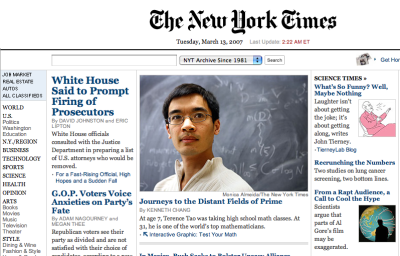Sometimes happiness is simply a new pair of shoelaces.
Entries from March 2007 ↓
Sigi Says That I Should Blog More Often
March 30th, 2007 — General
Does He Say "Math" or "Maths"?
March 22nd, 2007 — General
I was going to stick an Update on my previous post (on Terry in the New York Times) but it’s sort of evolved into a full post. It turns out that my 大哥 has a shiny new WordPress. For example in his response to the NYT story, there’s a discussion about math education, and Terry says
“For instance, while teaching undergraduate linear algebra here in the U.S., I’ve found that students respond well to the story of how two Stanford graduate students in mathematics and computer science managed to exploit the theory of singular value decompositions of large sparse matrices to create a rather well-known multi-billion dollar web search company 🙂 .”
For the non (linear algebraists) amongst us (not to be confused with the (non-linear) algebraists), he’s talking about PageRank and the Google. I’d also add computer graphics and games as another reason for the kids to wanna learn linear algebra. I can hardly remember what dull rag my MATH1001 professor waved to try and motivate us, but it was, by definition, forgettable.
He also has a rather interesting riff (this time for armchair physicists) on Lara Croft as an analogy for Quantum Mechanics. I always thought that her body defied the classical laws of physics. 🙂
Twitbar 2.0
March 20th, 2007 — General
With the youth of today’s attention spans halving every 18 months, it is good to know that Deskbar’s triple-extreme ease of extensibility (that’s XXXEoE™) meant that, for Phil Wilson, "it took longer to write [his] blog post than [a Post-to-Twitter Deskbar extension]"
Python rocks. \m/
Calling All Szemerédi Fans
March 18th, 2007 — General
One of the reason’s why Terry Tao‘s wig is so big in the math world is the Green-Tao theorem, which states that the sequence of prime numbers contains arbitrarily long arithmetic progressions.
If that means anything to you, you might be interested in his forthcoming article in the Bulletin of the American Mathematical Society, entitled “What is Good Mathematics” (PDF). He’s also in a
New York Times article from last week, and his little brothers gets a mention. Yay me – I’m in the NYT. 🙂

Election, Shmelection
March 18th, 2007 — General
Having nothing new to say about technology at the moment, here is a brief interlude…
A state election is coming up, which for all practical purposes means that I am supposed to bless one of the two major political parties. The trouble is that I find both prospects are utterly uninspiring (yes, even more uninspiring than the usual parade of political hacks), and the polls show that I am not alone. The incumbent is corrupt and incompetent, but is predicted to lurch home in front of a totally forgettable and farcical opposition.
Actually, there are politicians that I admire (!), but they don’t happen to be in my electorate. In fact, I’ve always lived in “safe” (rather than marginal) seats, so I feel like my vote doesn’t matter anyway, and I’m being taken for granted. Marginal seats get the pork barrels, boundaries are gerrymandered, and geographically dispersed interests are under-represented. So I got to thinking… what if we had a democracy without electorates? Or, to be precise, a single electorate – the whole country.
Here’s how it would work. I would go to the ballot box, and put one X next to the name of who I wanted to represent me in the nation’s Parliament, and that’s that. Those who mustered a minimum number of votes (say, 0.01% of the voting population) would become Members of Parliament. But not all MPs would be equal, their vote in Parliament would be weighted by how many votes they garnered at the election. A majority would be still needed to pass laws. Not a majority of MPs (or a majority of seats), but a weighted majority, representing the population. Corporations work somewhat like this. Some shareholders have a greater share than others, and thus have greater say in how the corporation is run. I wonder if there’s any lessons from the corporate experience (or elsewhere) as to how this alternative universe would pan out.
Ah, but what if a tremendously charismatic evil genius takes 55% of the vote at election time, then the system becomes a one-person dictatorship, no? One countermeasure would be to have rolling elections, so that each MP was elected for a four year term, but we had elections every two years, so that only half of the Parliamentary weight would be up for grabs at each election – each citizen is represented twice. No one MP could represent a majority weight solely by himself (or herself).
Would this work? Am I a naïve engineer trying to imagine an mathematical fix for a messy human problem? Would this reduce elections to a popularity contest, or beauty over brains? Would this lead to only extremist politicians backed by vocal, passionate interest groups? Would this lead to weak and unstable (and ineffective?) government, if there was no clear majority party (as you get in the two-party system)? Would it lead to opportunist, independent politicians selling off their critical (weighted) vote if a proposal is hovering around the 50% mark? Would it destroy the concept of a political party entirely (why vote for a follower when you could vote for the leader)? Would that ruin the Westminster notion of the executive (Ministers) being drawn from, practically speaking, MPs of the majority party? Is it even logistically possible?
All I really want is a reason to vote for (rather than against) somebody next week. (Sigh)…